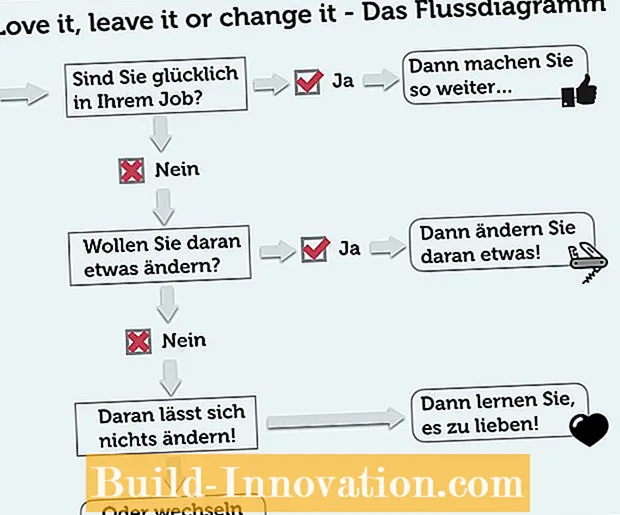Change of job: Tips for restarting your dream job

Content
- Job change test: is it time?
- Test: does it make sense to change jobs?
- Reasons for changing jobs: Why do you end up in the wrong job?
- Alternatives: What to do if you have a wrong job?
- Talk, learn, search
- How can you change your job?
- When does the employment office take on retraining?
- 9 tips for a successful change
- 1. Self-reflection
- 2. Setting
- 3. Research
- 4. Career choice test
- 5. Competence test
- 6. Support
- 7. Advice
- 8. Internship
- 9. Planning
The wrong job is not only a career dead end, but a guarantee for further problems and personal dissatisfaction. If every working day is characterized by a lack of motivation, frustration and thoughts of flight, this also affects all other areas. A career change can bring about the much-needed change. But this step is difficult for many. They prefer to choose the known evil rather than the chance of improvement - out of fear of what will happen to them. We show when the time has come for a career change, what you have to pay attention to and how it works ...
Job change test: is it time?
Man is a master of self-deception. So many accept the job frustration and come to terms with a job for 10, 20 or even 30 years. But this only works in the rarest of cases. Anyone who is permanently stuck in the wrong job becomes unbearable. Partnerships and friendships suffer as a result. And not only that: if you don't do anything, you get sick. This has a negative effect on your quality of life.
Time to change something. Better to find the right time, take the plunge and start over with a career change. But when exactly is it time to change jobs? There is probably never the perfect moment. But there are some unmistakable signs that you should urgently consider changing careers.
Test: does it make sense to change jobs?
Does a career change make sense? Find out with this test. Click where applicable in the browser:
- Every day you wish you didn't have to go to work.
- You are not only dissatisfied at work, but also in your private life.
- Money is the only motivation.
- When you talk about your job, only negative things come to mind.
- They envy friends for their jobs.
- Your health suffers from the job situation.
- At work you either feel totally bored, overwhelmed or constantly stressed.
- They're looking for excuses not to go to work.
- You cannot pursue your passion because of your job.
- In your mind you play through a career change over and over again.
The more statements you could tickthe more sensible it is to change jobs. From more than half (6+ crosses) you should definitely read on. A career change could be good for you.
Reasons for changing jobs: Why do you end up in the wrong job?
The choice of career should be well thought out, as it lays the foundation for a career - ideally over years and decades. How then is it that employees choose the wrong profession? In fact, there are several reasons:
- No clarity
Career starters in particular often do not even know what they are hoping for from working life. Your own wishes and expectations are not clearly defined. - Bad information
A wrong job can often be traced back to a lack of information in advance. Some school leavers only know a few professions. Even a student internship only scratches the surface. Without thorough research, however, the career choice remains a stroke of luck. - Little choice
Those who leave school with poor grades or even drop out of school have less choice. This applies to apprenticeships as well as to studies. In the end, the choice falls on the third or fourth best. Not the dream job. - Wrong criteria
A high salary or an education close to home are tempting. But they are not always the best selection criterion. - Social pressure
After school, you should start your first job quickly. The environment or parents indicate the direction. But does it fit the personality? Social pressure more often leads to the wrong job.
Alternatives: What to do if you have a wrong job?
Once a wrong job has been started, those affected feel trapped in it. Your financial situation depends on your income, and termination is not easy. There is also the fear that an early career change could look bad on your résumé and reduce future career opportunities.
In the end, there are only three options: Love it, leave it or change it!

Talk, learn, search
But they are not as powerless as many believe. In fact, there are more options on how to react if you think you are in the wrong job:
- Change internally
It doesn't have to be a complete upheaval and a new beginning. Instead of changing jobs, you can look for a solution with the boss. Maybe you can change internally, find a new job that suits you better. - Do further training
Another way: Shift your professional focus through further training or specialization. You use existing knowledge, but develop further. Internal or external. - change job
The last option that always remains: you change job and occupation. That's a big step, yes. But always possible. Even at 50. You may need to retrain or do new training and start small again. Also financially. But such a career change is better than working unhappily in the wrong job for the next 10 or 20 years.
How can you change your job?
Some companies offer shortened training opportunities for career changers. Especially where there is a great shortage of applicants. More often, when you change jobs, you need to retrain. This is a shortened training or further education that deviates from the old job.
Retraining is then an optionif someone is no longer able to do their old job due to an occupational disability. It's just as useful if you feel like you're stuck in a so-called bullshit job.
When does the employment office take on retraining?
Retraining is expensive and labor-intensive: Anyone who wants to lay a fundamentally new foundation for changing careers cannot earn money on the side. If there is acute dissatisfaction in the job, those who switch need a thick financial cushion. Or you can have the change financed by the employment office or job center. For this, certain requirements must be met:
- You already have vocational training (otherwise the retraining would be initial training).
- There are negative forecasts for the future: You are threatened with acute unemployment because demand has been falling continuously for years.
- Due to health problems, you can no longer practice the job you have learned. These include occupational diseases and psychological problems.
In all of these cases, the Employment Agency can support retraining (and thus a change of occupation). This is done by means of an education voucher. Important: There is no legal entitlement to this. Rather, it is purely a matter of discretion for the clerk to decide whether or not to approve the retraining.

The employment office not only pays the costs for the retraining, but also pays money for course costs (for purely school-based training), examination, living and travel costs as well as costs for childcare and external accommodation if the retraining takes place far away from the place of residence.
The pension insurance or health insurance company may also be of the opinion that retraining makes sense and will cover the costs. In such cases, the main aim is to maintain the employee's ability to work.
Job profiles: entry, career & free templatesIn our overview of the most important job descriptions and job profiles you will find everything about training, studies, career and salary prospects as well as job-specific tips and free application templates. Examples:
| ➠ nurse ➠ social educators ➠ order picker ➠ engineers ➠ actor | ➠ Naturopaths ➠ train driver ➠ Architects ➠ carpenter ➠ Computer scientist |
To the job profiles
9 tips for a successful change
A change of profession requires a good dose of courage. This is another reason why many employees prefer to stay in a job, even if it makes them unhappy. The risk of going from bad to worse is a deterrent. In addition, older employees in particular believe that they have little chance of success if they change careers at the age of 40 or 50. For older workers, changing jobs can be challenging, but it is by no means impossible. To make your career change a success, we have collected a few tips that can help you:
1. Self-reflection
Admitting to yourself that a career change is the best option is already the first big step. In order to avoid similar mistakes and to find the right job, extensive self-reflection is necessary. What do you want to achieve by changing your job? What has to change? Which factors play the greatest role in this? You can only tackle it successfully when you are really sure in which direction the change of occupation should lead you.
2. Setting
If the job is unhappy, many want to leave at all costs. However, this is the wrong attitude for a successful career change. Those who only look back and flee are not concentrating on what lies in front of them and what is coming next. This has two negative consequences: On the one hand, it becomes more difficult to clarify your own motivation in applications (keyword: towards motivation). It also increases the risk of simply taking on a job just to get rid of the old one - and ending up right where you were at the beginning.
3. Research
If you are in the wrong job, you usually paint other professions in the brightest colors. However, such rose-colored glasses are a hindrance to changing jobs. Stay as rational as possible and rely on facts and information. How big are your chances in your new job? What are the future prospects in this area? And what about the competition in the job market? The more you know about your intended job, the better you can prepare for and carry out the change of profession. Think about whether the career you are aiming for actually fits your personal strengths and interests. Only the combination of different points indicates that this is the right job for you.
4. Career choice test
You lack any orientation, are very insecure or have no idea which job suits you? Then a career choice test can be your first inspiration. You will answer various questions about your personality and assess your own preferences and strengths. As a result, you will receive an overview of professions that could match your profile. On this basis you can find out more and more detailed information about individual jobs. Reading tip: Career choice: tests and help.
5. Competence test
Similar to the career choice test, you can take a competence test that reveals your individual strengths and makes suggestions for professional fields for which you are particularly well suited. Positive side effect: a wrong job can damage your self-confidence. By contrast, those who make their own strengths and competencies clearer strengthen their self-esteem and that gives them the security of having good opportunities on the job market.
6. Support
Even a well-planned career change is a turning point and a big change. It is therefore advisable to speak to people who are close to you in advance and to secure their support. First and foremost, this is your family, who are directly affected by the change of profession and who have experienced the ups and downs. Explain your reasons and show that changing jobs is important to you. You will gain a lot of understanding that can further increase motivation for changing jobs.
7. Advice
You can master a lot on your own. But if you feel that you need help, there are various advisory services available. You can contact the job information center of the Federal Employment Agency in order to identify suitable jobs together. Numerous coaches also offer their (paid) services to help you move from a wrong job to a new one.
8. Internship
An internship is and will remain an effective means of getting a good and detailed impression of a job. You can find out for yourself what tasks you are facing and what the practice looks like. If you are unsure about the wrong job, an internship can make the transition easier by consolidating your decision.
9. Planning
You should prepare well for a career change. It is best to make a rough schedule of your project in advance. This is necessary because you may still be attending advanced training courses. Or having to acquire new skills in order to be prepared for the demands of the new position. To know what is expected of you as a candidate, you can look at job advertisements from potential employers. Here you will find quite precise job descriptions and requirement profiles. In addition, when planning your career, always keep in mind the notice period that you have to adhere to before changing jobs.



